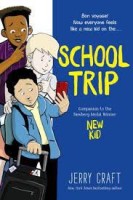"Do the herons know the difference between them and us?"
is the question asked by Anikwa, a young Indian boy growing up in Florida in 1812.
Told in Helen Frost's inimitable free verse this is a poignant and painful poem of two communities
living side by side in peace and harmony until the American soldiers appear on the scene and
destroy the Indian villages along with the natural world that surrounds them. The author's note informs
us that the shape of the poems comes from "patterns of Miami ribbon work" and James' poems began
as the stripes of the American flag. The two voices, Anikwa's and James', weave together to tell the story.
Anikwa's good friend, James, is his faithful companion as the boys carve, fish, swim and honor the
animals and forest. Their families also honor each other and have for years. It's only when the American
government intervenes and begins its machinations that things turn sour.
James struggles to understand which side is the right side. Anikwa's world is about to disappear.
Told poetically and sensitively this is a part of America's history that needs to be remembered.
History is personal and this poetic story takes a period that affected thousands and makes it real by telling it through
the voices of the individuals.
128 pages Ages 9-12 978-0374363871
*****
"I wonder who they are, the men who really run this land
And I wonder why they run it with such a thoughtless hand
What are their names and on what streets do they live
I'd like to ride right over this afternoon and give
Them a piece of my mind
About peace and mankind
Peace is not an awful lot to ask"
--David Crosby, Neil Young, Jerry Garcia, Phil Lesh, Michael Shrieve
(1971)
"JAMES
All this smoke is choking me. What's going on? Pa comes in with food,
but not 'cause he went hunting. He puts it on the table -- deer meat,
corn, maple sugar. And then a copper pot. The fiddle that belongs to Old
Raccoon.
Pa, I ask, who gave this to you? He answers: No one. They've all gone
away.
I took this from Old Raccoon's house before the soldiers set it on fire.
Pa stole from our friends? He slumps into a chair. Ma brings him water,
and we wait for him to tell us what's happening. Ma keeps coughing.
Her eyes are all red. Might be from the smoke, but it's also from
crying.
Pa starts talking: As far as I can tell, almost everyone in Kekionga left
before
the army got here. Probably went to a village west of here. When the
General
couldn't find anyone to fight, he said, 'We'll make sure no one comes back
later to cause trouble.' Ma objects, But most of the people in Kekionga don't
even want to fight this war! Pa nods. I know that. You know that. I couldn't
stop them, Lydia.
I ask, How will they make new houses before winter? Pa mutters, That is
the idea."
In reading SALT: A STORY OF FRIENDSHIP IN A TIME OF WAR, Helen Frost's
verse novel about a pair of twelve year-olds living in the shadows of Fort
Wayne in 1812, I have lost some respect for President James Madison.
Madison, when he was in his thirties, was instrumental in the drafting of
the U.S. Constitution; was an author of The Federalist Papers (which were
key to gaining state-by-state ratification of the Constitution); and was
then also responsible for drafting the Bill of Rights -- the first ten
amendments to the U.S. Constitution. Truly amazing guy and Founding Father,
right?
But I believe that the Commander in Chief is ultimately responsible for
what happens "on the ground" in a war, and I cannot imagine that the
atrocities perpetuated against the fictional members of the Miami tribe we meet
here, who lived near Fort Wayne, and perpetuated against Mother Nature, as we
also learn in this tale, were unique occurrences during the War of 1812.
Helen Frost has spent a lot of time researching the historical background
for this story, so you can bet that this stuff really happened.
And so, in my eyes, Madison, who was President from 1809 until 1817
becomes one more wealthy slave owner, albeit a brilliant-minded, wealthy slave
owner, who became President and let American troops run amuck. "You break
it, you own it." I said this about George W. Bush and his wars. I think
it's logical that I hold James Madison to the same standard.
Now, I need to make it very clear that President James Madison is not part
of, nor ever mentioned in this story. But I was so caught up in the guy
friendship aspect and then so moved with grief in reading the later portions
of this historical fiction story, that I found myself pondering at length
about who was responsible for what happens here.
What this story is about are those two aforementioned twelve year-olds
from whose points of view the story is told. Anikwa is a member of the Miami
tribe living in the village called Kekionga, close to Fort Wayne. James
Gray is the son of the owner of the trading post that is situated within the
stockade adjoining the Fort. The two boys are good friends who frequently
hang out together, and there is such richness in their intercultural
connection. The parents know one another through the commerce that takes place
at the trading post. This knowing one another leads James' parents to
being more enlightened than the other white folks we meet here and, in turn,
James is open and trusting of the residents of Kekionga (in sharp contrast to
another white boy, Isaac, who we also come to know).
Helen Frost always employs fascinating poetry forms in her verse novels.
Here, Anikwa's poems are shaped like patterns of Miami ribbon work, while
James' poems are like stripes on the American flag.
Great historical fiction is well-researched, well-written, moving, and
causes one to be interested in further knowledge about the subject. These are
all things that make SALT: A STORY OF FRIENDSHIP IN A TIME OF WAR a great
piece of historical fiction.
Recommended by: Richie Partington, Librarian, California USA






